Across industries, marketers are often misled by the term B2B. If you believe social listening is a “nice to have” in a B2B marketing strategy as opposed to an actual fundamental component, then you’ve been misled as well.
Social media is considered by many to be a consumer-only space, and by relation, social listening has been overlooked by the B2B world. However, social media use by B2B professionals increased 43% between 2021 and 2022, evidence of the increasing importance of social media in the business world.
In fact, many businesses are shifting their strategies to leverage this change, and it’s working. According to a study by Wpromote and Ascend2, 60% of US B2B marketers named social media as their most effective revenue-driving channel.
After all, companies do not make purchasing decisions—people do. By actively listening to your customer base and meeting them where they are, you can unlock the power of social selling, which can lead to significant growth in the B2B sector.
What Is Social Listening?
Social listening is the process of analyzing online conversations to understand what customers and potential clients are talking about. It’s like having ears all over the internet, specifically tuned to hear what people are saying about your brand, products, industry, or even competitors.
Use of social listening software provides marketers with the ability to make informed decisions and create impactful marketing messages. There’s no need to make assumptions about your target markets’ needs—you’ll have the data to back up your ideas. Keeping pace with emerging social listening trends also ensures you're leveraging these tools in the most strategic and forward-looking ways.
Here are a few examples of what you might learn with social listening:
- Monitoring Competitors' Mentions: Reveals a recent stream of negative customer feedback, providing opportunities to learn where they went wrong, and how you can do better.
- Setting Alerts from Industry Publications: Provides daily updates on industry trends and developments.
- Tracking Hashtags Related to Your Brand: Uncovers user-generated content that can be shared or used for marketing purposes.
- Analyzing Influencer Conversations: Identifies potential influencer partnerships that align with your brand values.
Being certain in the insights gained from the examples above is priceless for marketers. The information uncovered can shape your communication approach and enhance your content planning.
B2B Benefits Of Social Listening
For B2B, social listening does much more than just keeping tabs on social media chatter. It’s a strategic tool that can help your business:
- Understand Needs and Concerns: By listening to what other business professionals are saying, you can identify their pain points and needs, allowing you to tailor your products, services and messaging to meet those specific demands.
- Prompt Lead Generation: Social listening enables you to identify potential leads by monitoring conversations and engaging with prospects who are discussing topics relevant to your industry. Are they expressing needs that your products or services can fulfill? Share your solutions!
- Enhance Customer Service: If a business client mentions a problem or asks a question online, social listening allows you to respond promptly. In fact, 46% of B2B buyers said social media was their preferred method to reach and discover B2B sellers.
- Identify Opportunities: You might discover unmet needs in the market or find potential partners and collaborators. Social listening can uncover opportunities that might otherwise go unnoticed.
- Measure Brand Perception: How do other businesses view your brand? Social listening provides insights into your reputation within the industry, helping you to build and maintain a positive image.
Understanding Social Listening Strategies
Where do you start with social listening? As with most strategies, you must start at the end, by outlining your desired results.
For example, let’s say you’re building out a blog for your SaaS company. You’re hoping to create insightful content around trending topics in the industry, with the goal of driving more traffic to the company website.
In this case, you’d create a social listening and social monitoring strategy focused on target market research. This involves monitoring relevant hashtags, keywords and discussions related to your industry.
By keeping your ear to the ground, you can turn online conversations into informed pieces of content that connect to relevant issues, developments and events occurring in your industry.
Of course, a robust social listening strategy can provide multiple data points and benefits. Target market research, lead generation, and relationship management can be done all at once. Here’s a quick breakdown of the most impactful strategies to consider for B2B social listening:
Target Market Research
- What it is: Understanding the specific needs, preferences, and pain points of your target market.
- How to do it: Monitor conversations, questions, and feedback related to your industry. Analyze trends and common themes.
- Benefits: Enables the creation of more targeted and relevant products, services, and marketing messages.

Lead Generation
- What it is: Identifying potential business clients or partners who may be interested in your offerings.
- How to do it: Track mentions of specific needs or problems that your products/services can solve. Engage with potential leads by providing valuable insights or solutions.
- Benefits: Increases sales opportunities and helps in building a pipeline of potential clients.
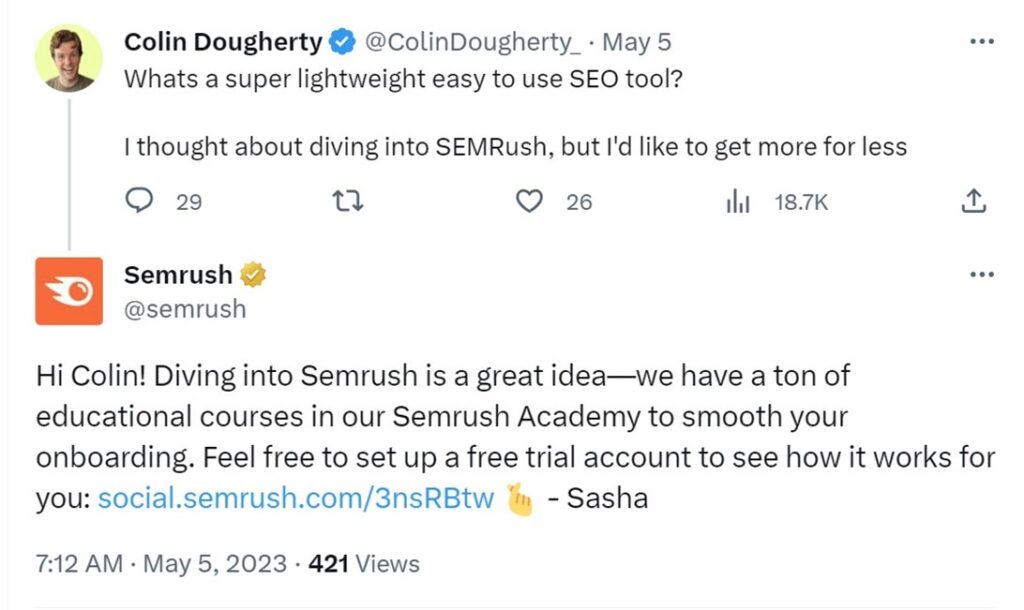
Competitor Analysis
- What It Is: Monitoring what competitors are doing, their customer interactions, and public perception.
- How to Implement: Regularly track competitors' social media activity, product launches, customer feedback, and media coverage.
- Benefits: Helps in understanding the competitive landscape, identifying opportunities, and avoiding competitors' mistakes.
Crisis Management
- What It Is: Early detection and management of potential crises that could harm the company's reputation.
- How to Implement: Set up alerts for negative mentions or spikes in activity related to your brand. Have a response plan ready.
- Benefits: Enables quick response to mitigate damage and maintain brand integrity.
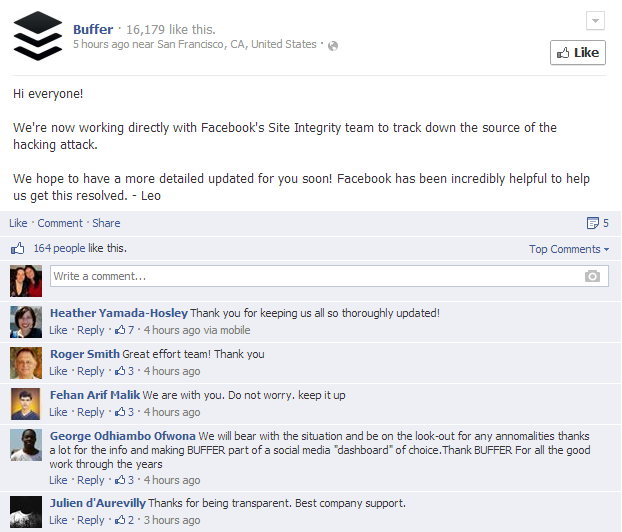
Campaign Analysis
- What It Is: Evaluating the effectiveness of marketing campaigns.
- How to Implement: Monitor engagement, sentiment, and conversion related to specific campaigns. Compare against benchmarks or competitors.
- Benefits: Provides insights into what works and what doesn't, allowing for continuous improvement.
Relationship Management
- What It Is: Building and maintaining positive relationships with clients, partners, and influencers.
- How to Implement: Engage regularly with key stakeholders on social media. Recognize positive mentions, respond to inquiries, and provide valuable content.
- Benefits: Enhances loyalty, fosters collaboration, and strengthens your network.
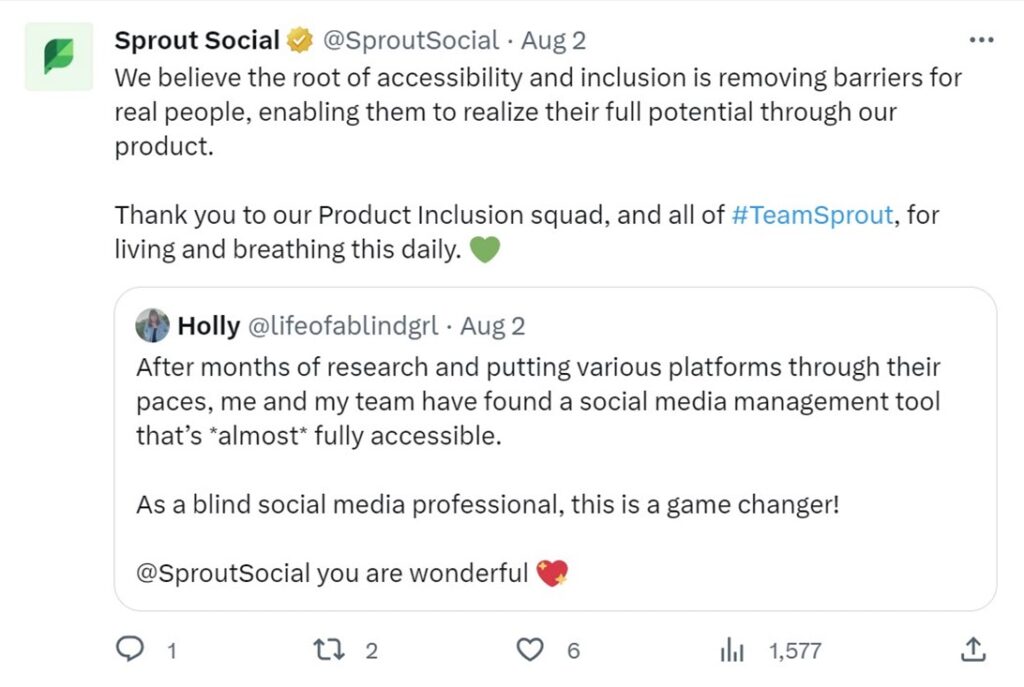
Social Customer Service
- What It Is: Providing customer support and service through social media channels.
- How to Implement: Set up dedicated channels or personnel to respond to customer inquiries, complaints, or feedback on social media.
- Benefits: Increases customer satisfaction, provides a more immediate response, and showcases your commitment to service.
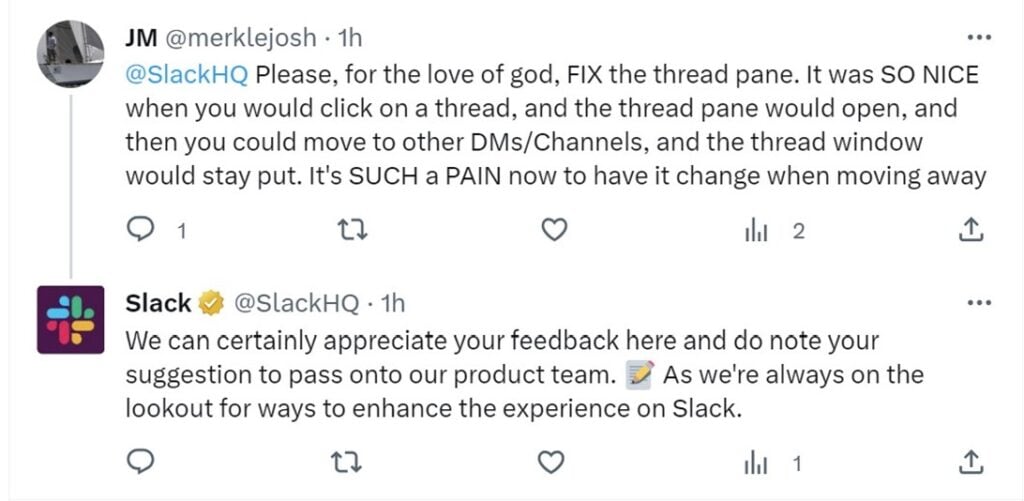
Social Listening Tools
By now, your social listening strategy is beginning to take shape. However, monitoring hundreds of online conversations, interactions and brand mentions is no simple task.
Social listening tools are the solution, allowing you to sift through the noise and pinpoint the most relevant dialogues and information. In many cases, social listening tools are baked into social media management software, which provides your teams with the ability to create, schedule, monitor, and manage all your social media content all in one place.
So, what are your options? Here are four all-in-one social listening tools that provide comprehensive solutions for B2B brands:
1. Agorapulse
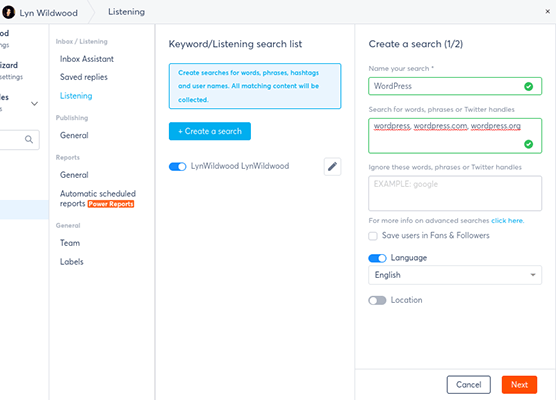
Standout Features:
- Consolidation of all social media interactions into a unified inbox
- Intuitive interface for efficient tracking and response
- Robust team collaboration and workflow management tools
Overview: Agorapulse is designed to be a comprehensive tool for social listening. Its unified social media inbox consolidates all your comments, messages, and mentions from various platforms into one centralized hub.
This enables you to monitor and respond to social conversations efficiently. Agorapulse ensures that no engagement goes unnoticed, allowing you to track brand mentions, analyze sentiment, and understand your audience's needs.
2. Hootsuite

Standout Features:
- Unified dashboard for all social media activities
- Monitoring of brand mentions and keywords
- Sentiment analysis
- Social media post scheduling and management
- Integration with various social platforms
- Comprehensive reporting and analytics
Overview: With Hootsuite, you have access to a wide range of social media management tools, including the ability to schedule posts, analyze data, and engage with your audience. Hootsuite's social listening features allow you to monitor specific social media “streams” such as mentions, follows, shares and more.
This allows you to see all of your most critical social interactions from a consolidated dashboard, making it much easier to stay connected with your audience, respond to customer feedback, and gain insights into market trends. If you need more advanced capabilities, you can also explore Hootsuite Insights for a deeper understanding of your social media landscape.
3. Sprout Social
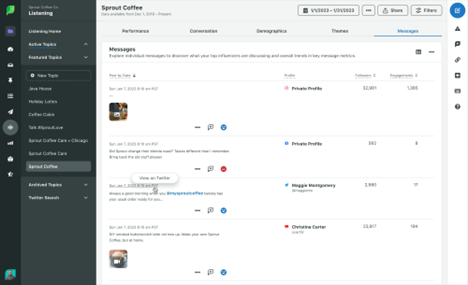
Standout Features:
- Intuitive interface for tracking conversations
- Trend analysis and audience engagement tools
- Cross-platform post scheduling
- Unified inbox for all social interactions
- Competitor analysis
- Customizable reporting tools
Overview: Sprout Social is known for its powerful social listening and analytics tools. It enables B2B brands to track conversations, analyze trends, and schedule posts across multiple channels.
Where Sprout Social really excels is at breaking down billions of data points into easily digestible insights and reports. With its intuitive interface and AI-automation, Sprout Social provides a comprehensive view of your social media performance, helping your team’s make data-driven decisions.
4. Brandwatch
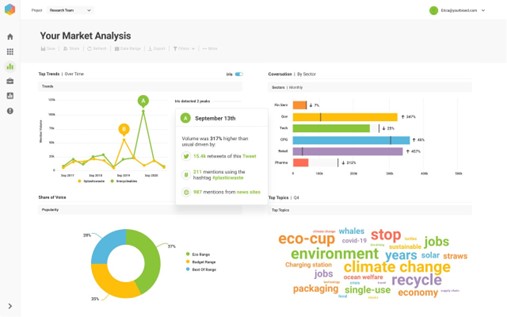
Standout Features:
- Comprehensive monitoring across social media, blogs, and forums
- Real-time tracking of brand mentions and sentiment
- Powerful analytics engine for data dissection
- Trend identification and emerging topic detection
Overview: Brandwatch is a leading player in the social intelligence arena. They offer a suite of tools designed for comprehensive social listening and analysis. It's particularly favored by B2B brands for its ability to monitor and analyze conversations across various online platforms, including social media, blogs, and forums.
Before making a decision on buying a social listening tool, it's important to understand cost structures and what features will be available to you with each pricing tier.
Are You Ready To Listen?
Social listening is no longer just for consumer-focused brands—consider it your secret weapon for unraveling your market's insights, improving your brand messaging, and fostering genuine connections.
While social media was once predominantly associated with consumer realms, the tides have shifted dramatically. In fact, 63% of social media marketers believe social listening will become more important over the next year.
Are you ready to listen and learn? Then sign up for the CMO newsletter! Get your fill of fresh B2B marketing insights to stay ahead of the curve.


